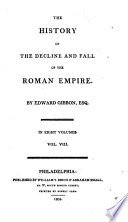 | Edward Gibbon - 1796 - 360 pages
...the nonjuror, on the ground which is common to both , approves himfelf at leaft equal to the prelate. On the appearance of the Fable of the Bees, he drew his pen againft the licentiousdoctrine that private vices are public benefits, and morality as well as religion... | |
 | 1796 - 746 pages
...nonjuror, on the ground which is сотгпоя to both, approves himfelf at leaft equal to the prelate. On the appearance of the Fable of the Bees, he drew his pen againft the licentious doftrine that private vices are public benches, and morality, as well as religion,... | |
 | 1796 - 816 pages
...the nonjuror, on the ground which is common to Ы th, approves himfelf at leaft equal to the prelate. On the appearance of the Fable of the Bees, he drew his pen againtt the licentious doctrine ¡hat private vices are public benedts, and morality, as well as religion,... | |
 | 1797 - 512 pages
...the nonjuror, on the ground which is common to both, approves himfelf at lead equal to the prelate. On the appearance of the Fable of the Bees, he drew his pen againft the licentious doclrine that private vices are public benefits, and morality, as well as religion,... | |
 | Edward Gibbon - 1805 - 512 pages
...the nonjuror, on the ground which is common to both, approves himself at least equal to the prelate. On the appearance of the Fable of the Bees, he drew his pen against the licentious doctrine that private vices are public benefits, and morality as well as religion must join... | |
 | Alexander Chalmers - 1815 - 558 pages
...the nonjuror, on the ground which is common to both, approves himself at least equal to the prelate. On the appearance of the ' Fable of the Bees,' he drew his pen against the licentious doctrine that private vices are public benefits, and morality as well as religion must join... | |
 | 1815 - 558 pages
...the nonjuror, on the ground which is common to both, approves himself at least equal to the prelate. On the appearance of the ' Fable of the Bees,' he drew his pen against the licentious doctrine that private vices are public benefits, and morality as well as religion must join... | |
 | John Nichols - 1815 - 866 pages
...the Nonjuror, on the ground which is common to both, approves himself at least equal to the Prelate. On the appearance of the 'Fable of the Bees,' he drew his pen against the licentious doctrine, that private vices are public benefits ; and Morality as well as Religion must... | |
 | Edward Gibbon - 1816 - 498 pages
...nonjuror, on the ground which is common to both, approves himself at least equal to the prelate. OR the appearance of the Fable of the Bees, he drew his pen against the licentious doctrine that private vices are public benefits, and morality as well as religion must join... | |
 | William Law - 1818 - 152 pages
...Hoadley, in which his Nonjuring principles appear, though he approves himself equal to both Prelates. " On the appearance of the " Fable of the Bees," he...victory. " Mr. Law's master-piece, the " Serious Call," is still read as a popular and powerful book of devotion. His precepts are rigid, but they arc formed... | |
| |